Module 3 Unit 5 Period 5 practice&culture corner 导学案(含答案) 牛津深圳版英语八年级上册
文档属性
| 名称 | Module 3 Unit 5 Period 5 practice&culture corner 导学案(含答案) 牛津深圳版英语八年级上册 |
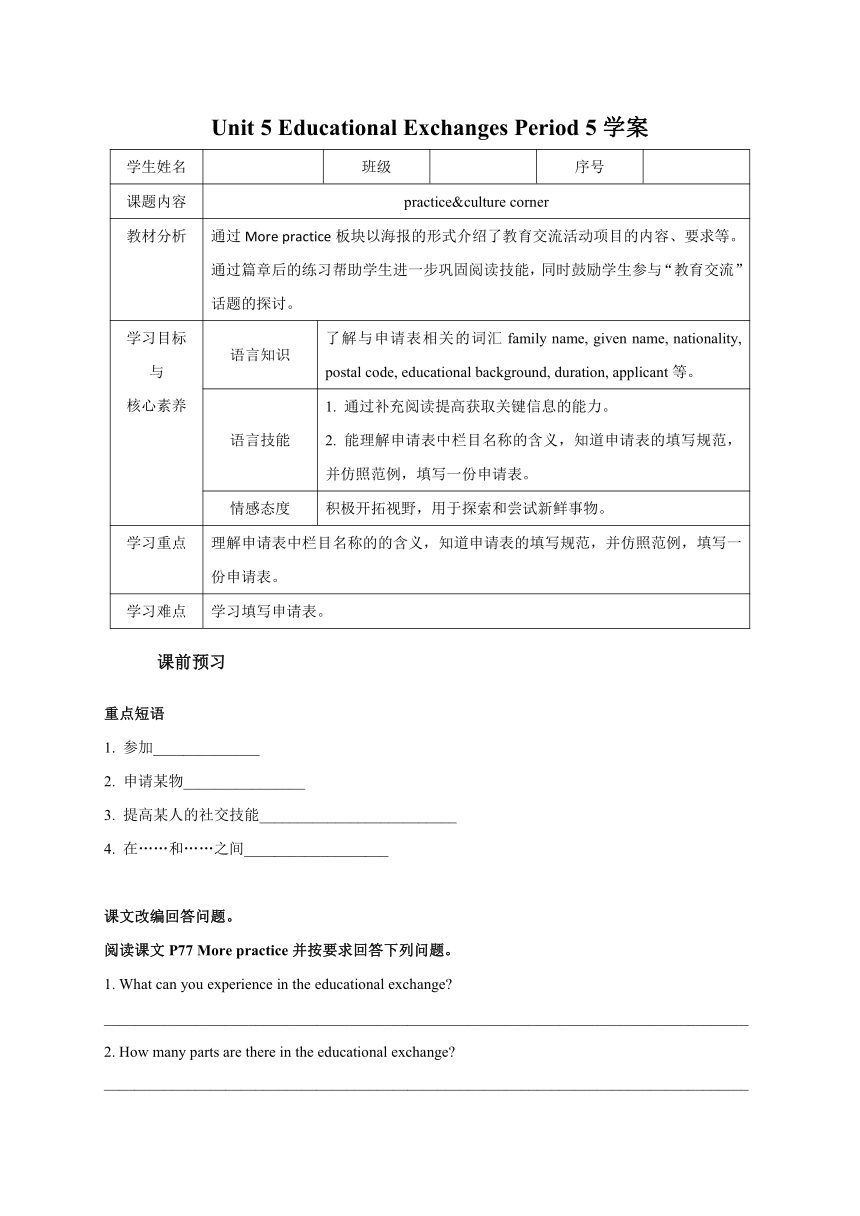
|
|
| 格式 | docx | ||
| 文件大小 | 190.0KB | ||
| 资源类型 | 教案 | ||
| 版本资源 | 牛津深圳版 | ||
| 科目 | 英语 | ||
| 更新时间 | 2024-09-26 00:00:00 | ||
图片预览

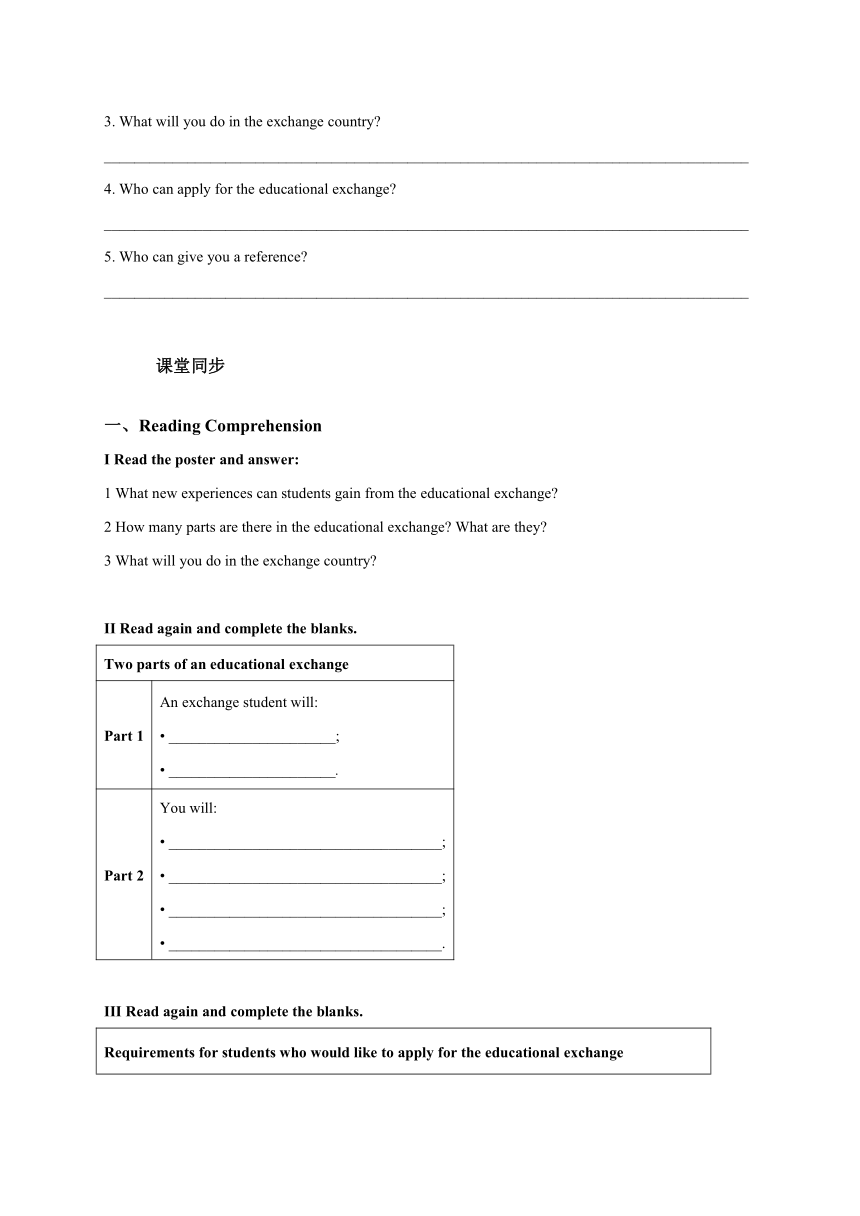
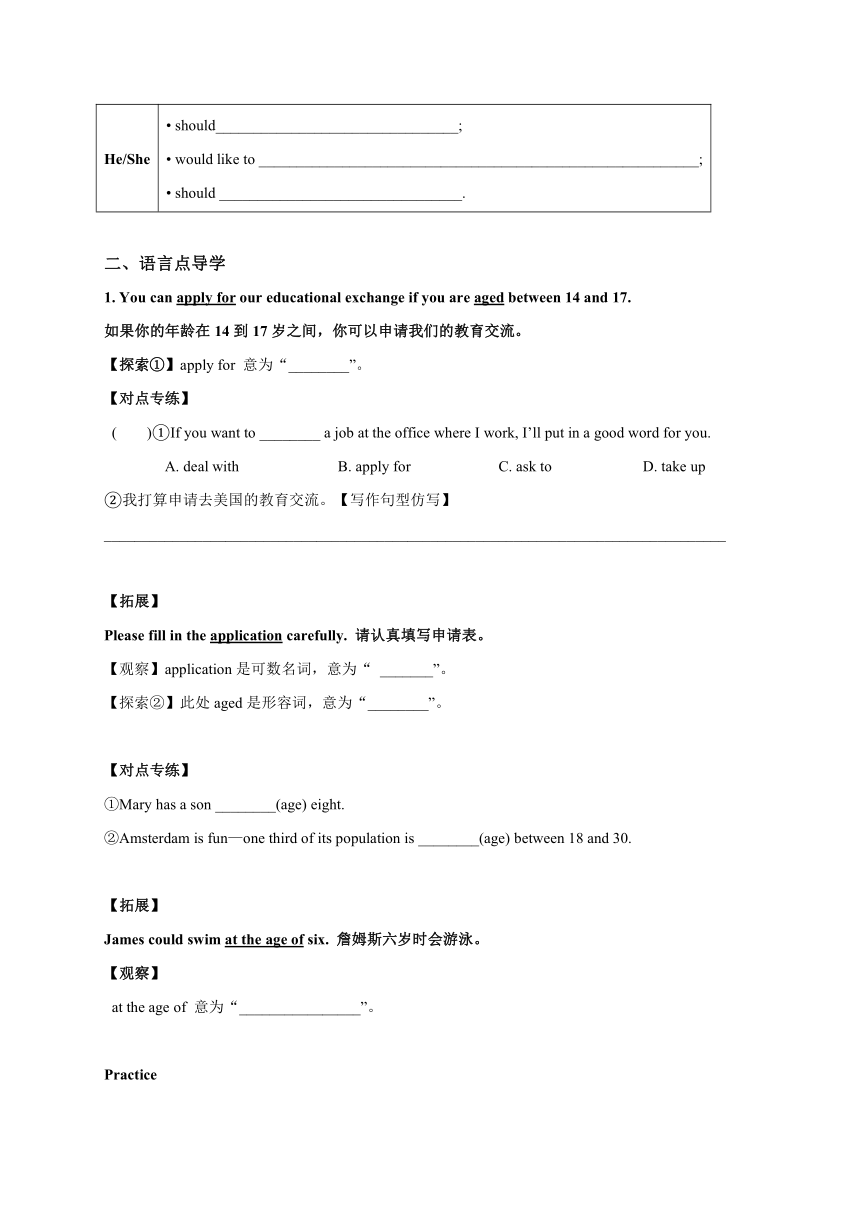
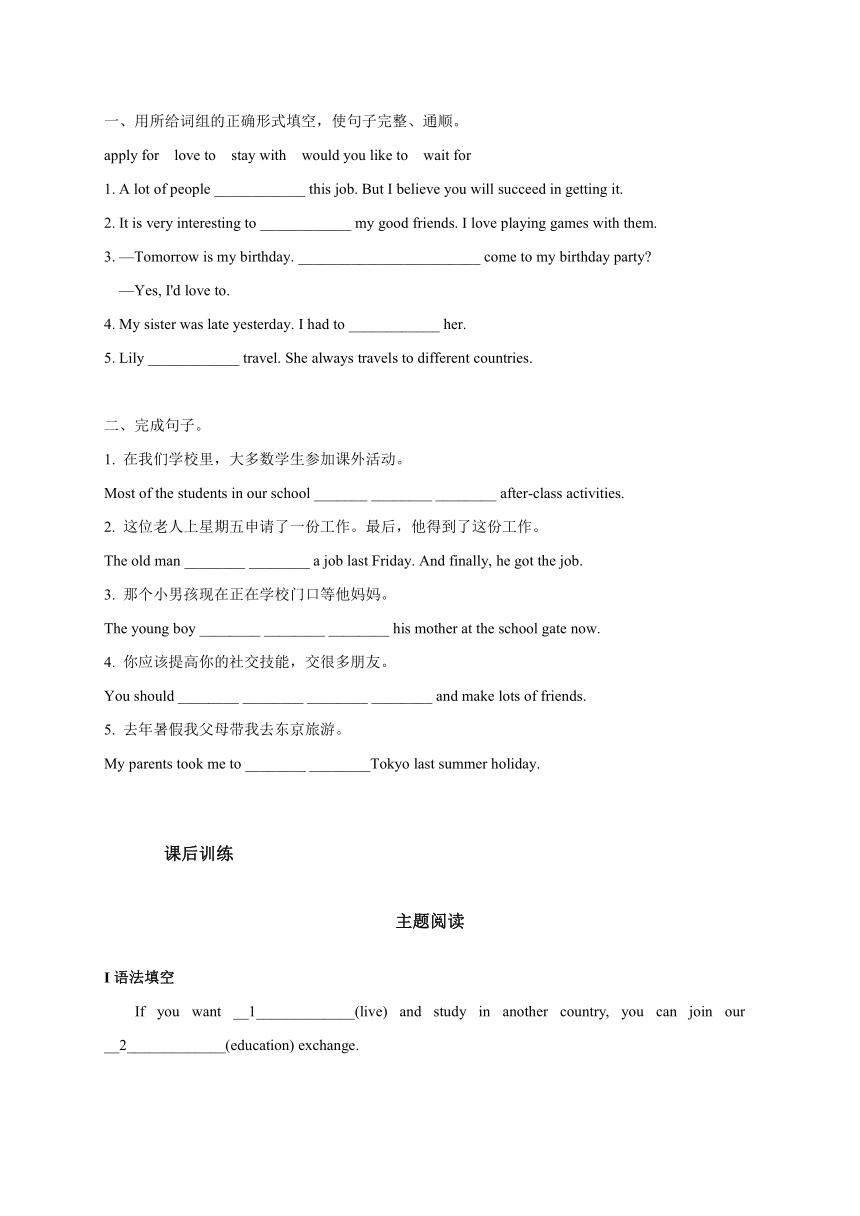
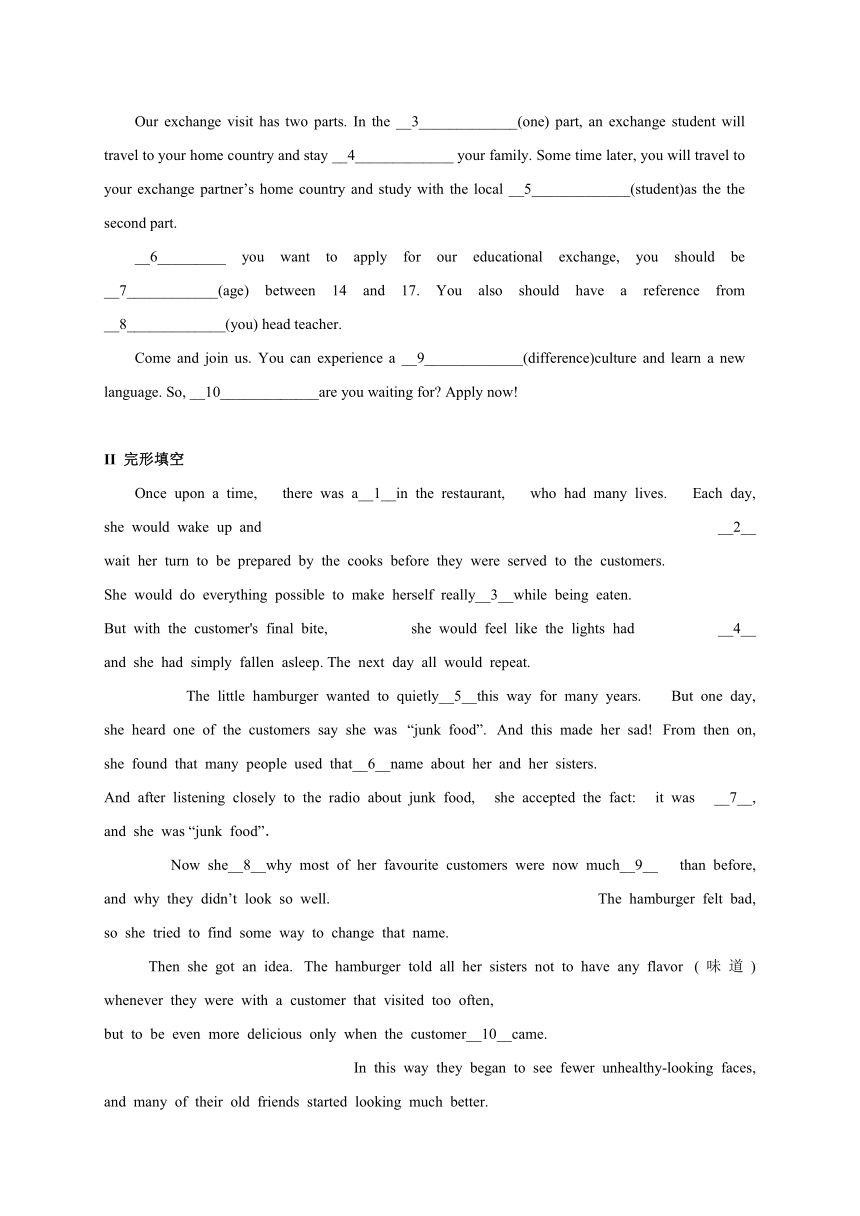
文档简介
Unit 5 Educational Exchanges Period 5学案
学生姓名 班级 序号
课题内容 practice&culture corner
教材分析 通过More practice板块以海报的形式介绍了教育交流活动项目的内容、要求等。通过篇章后的练习帮助学生进一步巩固阅读技能,同时鼓励学生参与“教育交流”话题的探讨。
学习目标 与 核心素养 语言知识 了解与申请表相关的词汇family name, given name, nationality, postal code, educational background, duration, applicant等。
语言技能 1. 通过补充阅读提高获取关键信息的能力。 2. 能理解申请表中栏目名称的含义,知道申请表的填写规范,并仿照范例,填写一份申请表。
情感态度 积极开拓视野,用于探索和尝试新鲜事物。
学习重点 理解申请表中栏目名称的的含义,知道申请表的填写规范,并仿照范例,填写一份申请表。
学习难点 学习填写申请表。
重点短语
1. 参加______________
2. 申请某物________________
3. 提高某人的社交技能__________________________
4. 在……和……之间___________________
课文改编回答问题。
阅读课文P77 More practice并按要求回答下列问题。
1. What can you experience in the educational exchange
_____________________________________________________________________________________
2. How many parts are there in the educational exchange
_____________________________________________________________________________________
3. What will you do in the exchange country
_____________________________________________________________________________________
4. Who can apply for the educational exchange
_____________________________________________________________________________________
5. Who can give you a reference
_____________________________________________________________________________________
一、Reading Comprehension
I Read the poster and answer:
1 What new experiences can students gain from the educational exchange
2 How many parts are there in the educational exchange What are they
3 What will you do in the exchange country
II Read again and complete the blanks.
Two parts of an educational exchange
Part 1 An exchange student will: ______________________; ______________________.
Part 2 You will: ____________________________________; ____________________________________; ____________________________________; ____________________________________.
III Read again and complete the blanks.
Requirements for students who would like to apply for the educational exchange
He/She should________________________________; would like to __________________________________________________________; should ________________________________.
二、语言点导学
1. You can apply for our educational exchange if you are aged between 14 and 17.
如果你的年龄在14到17岁之间,你可以申请我们的教育交流。
【探索①】apply for 意为“________”。
【对点专练】
( )①If you want to ________ a job at the office where I work, I’ll put in a good word for you.
A. deal with B. apply for C. ask to D. take up
②我打算申请去美国的教育交流。【写作句型仿写】
__________________________________________________________________________________
【拓展】
Please fill in the application carefully. 请认真填写申请表。
【观察】application是可数名词,意为“ _______”。
【探索②】此处aged是形容词,意为“________”。
【对点专练】
①Mary has a son ________(age) eight.
②Amsterdam is fun—one third of its population is ________(age) between 18 and 30.
【拓展】
James could swim at the age of six. 詹姆斯六岁时会游泳。
【观察】
at the age of 意为“________________”。
Practice
一、用所给词组的正确形式填空,使句子完整、通顺。
apply for love to stay with would you like to wait for
1. A lot of people ____________ this job. But I believe you will succeed in getting it.
2. It is very interesting to ____________ my good friends. I love playing games with them.
3. —Tomorrow is my birthday. ________________________ come to my birthday party
—Yes, I'd love to.
4. My sister was late yesterday. I had to ____________ her.
5. Lily ____________ travel. She always travels to different countries.
二、完成句子。
1. 在我们学校里,大多数学生参加课外活动。
Most of the students in our school _______ ________ ________ after class activities.
2. 这位老人上星期五申请了一份工作。最后,他得到了这份工作。
The old man ________ ________ a job last Friday. And finally, he got the job.
3. 那个小男孩现在正在学校门口等他妈妈。
The young boy ________ ________ ________ his mother at the school gate now.
4. 你应该提高你的社交技能,交很多朋友。
You should ________ ________ ________ ________ and make lots of friends.
5. 去年暑假我父母带我去东京旅游。
My parents took me to ________ ________Tokyo last summer holiday.
主题阅读
I语法填空
If you want __1_____________(live) and study in another country, you can join our __2_____________(education) exchange.
Our exchange visit has two parts. In the __3_____________(one) part, an exchange student will travel to your home country and stay __4_____________ your family. Some time later, you will travel to your exchange partner’s home country and study with the local __5_____________(student)as the the second part.
__6_________ you want to apply for our educational exchange, you should be __7____________(age) between 14 and 17. You also should have a reference from __8_____________(you) head teacher.
Come and join us. You can experience a __9_____________(difference)culture and learn a new language. So, __10_____________are you waiting for Apply now!
II 完形填空
Once upon a time, there was a__1__in the restaurant, who had many lives. Each day, she would wake up and __2__ wait her turn to be prepared by the cooks before they were served to the customers. She would do everything possible to make herself really__3__while being eaten. But with the customer's final bite, she would feel like the lights had __4__ and she had simply fallen asleep. The next day all would repeat.
The little hamburger wanted to quietly__5__this way for many years. But one day, she heard one of the customers say she was “junk food”. And this made her sad! From then on, she found that many people used that__6__name about her and her sisters. And after listening closely to the radio about junk food, she accepted the fact: it was __7__, and she was “junk food”.
Now she__8__why most of her favourite customers were now much__9__ than before, and why they didn’t look so well. The hamburger felt bad, so she tried to find some way to change that name.
Then she got an idea. The hamburger told all her sisters not to have any flavor (味道) whenever they were with a customer that visited too often, but to be even more delicious only when the customer__10__came.
In this way they began to see fewer unhealthy-looking faces, and many of their old friends started looking much better.
And these hamburgers became much more popular from then on, because more people think it's nicer to taste something after a while of not having had it.
( ) 1. A. cook B. hamburger C. worker D. waiter
( ) 2. A. nervously B. sadly C. seriously D. patiently
( ) 3. A. beautiful B. clever C. useful D. delicious
( ) 4. A. gone out B. gone back C. gone to D. gone up
( ) 5. A. share B. make C. live D. show
( ) 6. A. terrible B. fantastic C. funny D. nice
( ) 7. A. boring B. true C. special D. polite
( ) 8. A. doubted B. forgot C. understood D. asked
( ) 9. A. tired B. healthier C. richer D. fatter
( ) 10. A. often B. never C. seldom D. once
III.阅读理解
A
I'm Jack. When my family moved to America in 2010 from Guangdong, China, we brought not only our luggage, but also our rules, customs and culture. One of the rules was that young people should always respect(尊敬) the elders. Unluckily, this rule led to my very first embarrassment(窘迫) in the United States.
I had a part time job as a waiter in a Chinese restaurant. One time, when a wife asked me how the food could be served so quickly, I told her that I had made sure they got their food quickly because I always respect the elderly. As soon as I said that, she was a little annoyed. Then my manager took me aside and told me about how Americans dislike the word “old”. I then walked back to the table and said sorry to the wife. After she heard my reason, she understood and was no longer angry.
In my village in China, people are proud of being old. Not so many people live to be seventy or eighty, and people who reach such an age have the most knowledge and experience. Young people always respect older people because they know they can learn from the older people's rich experience.
However, for people in America, “old” shows that a person is going to retire(退休) or that the body is not working well. So many people try to keep themselves away from growing old by doing exercises, and women put on makeup, hoping to look young.
After that, I changed the way I had been with older people. It is not that I don't respect them any more; I still respect them, but now I don't show my feelings through words.
( )1. The underlined word “annoyed” in Paragraph 2 means ________.
A. nervous B. relaxed C. angry D. excited
( )2. What's true about the elderly in Jack's hometown
A. They are proud of being old. B. They dislike being called “old”.
C. They all reach the age of seventy or eighty. D. They are the first to get food in restaurants.
( )3. What happened to Jack after this experience
A. He lost his job in the restaurant. B. He made friends with the woman.
C. He no longer respected the elderly. D. He changed his way with older people.
( )4. In which section of the newspaper would you probably read this article
A. Environment. B. Culture. C. Education. D. Science.
B
信息匹配:下面的材料A~F分别介绍了一些需求,请根据每位人物的特点为他们选择与之相应的建议,并将其标号填入题前的括号内。
A. Sydney University Students Overseas Union will have a party. All the students are welcome to join.
B. Dazhang Supermarket:the end of season sale. You can buy lots of beautiful clothes at much cheaper prices.
C. House wanted:two or three bedrooms, a kitchen, at least a bath room, easy to go out.
D. Please offer your love and kindness to the poor children. You can donate (捐赠) some books, clothes or money for them.
E. Delicious Food Season:It will last two weeks from October 15 to 30. You can enjoy lots of delicious food here.
F. Mountain climbing. We'll go climbing this weekend. You must be strong enough to join us. If you are interested,please email us at loveclimbing@.
( ) 1. Dale is an active boy. He likes all kinds of sports,especially mountain climbing.He hopes to go climbing this weekend.
( ) 2. Wang Fang will study in Australia next term. She’d like to make some Australian friends.
( ) 3. Jack wants to sell his house.It has three bedrooms,a living room,a kitchen and a bath room.It's near a subway station.
( ) 4. Cindy wants to do something for people who are still poor and can't afford their education in the countryside.
( ) 5. Alice is a student. She likes beautiful clothes,but she doesn't have much money to buy them.
参考答案:
课前预习
一、
1. take part in
2. apply for sth.
3. improve one’s social skill
4. between…and…
二、
1. We can experience a different culture and learn a new language (in the educational exchange).
2. There are two/2 parts in the educational exchange.
3. We will travel to our exchange partner’s home country and stay with his or her family.
4. The people aged between 14 and 17 can apply for the educational exchange.
5. The head teacher can give us a reference.
课堂同步:
一、Reading Comprehension
I
1. They can experience a different culture and learn a new language. They can also improve their social skills and make lots of friends.
2. There are two parts in the educational exchange. In the first part, an exchange student will travel to your home country and stay with your family. In the second part, you will travel to your exchange partner’s home country and stay with his or her family.
3. You will go to school with your exchange partner. You will also take part in local activities.
II
III
二、语言点
1. 申请,B,I plan to apply for an educational exchange in the USA.
2. 申请表,……岁,aged, aged, 在……岁的时候
Practice:
一、
1. apply for
2. stay with
3. Would you like to
4. wait for
5. loves to
二、
1. take part in
2. applied for
3. is waiting for
4. improve your social skills
5. tour around
课后训练:
I语法填空
1. to live 2. educational 3. first 4. with 5. students
6. if 7. aged 8. your 9. different 10. what
II 完形填空 BDDAC ABCDC
III.阅读理解
A: CADB B: FACDB
学生姓名 班级 序号
课题内容 practice&culture corner
教材分析 通过More practice板块以海报的形式介绍了教育交流活动项目的内容、要求等。通过篇章后的练习帮助学生进一步巩固阅读技能,同时鼓励学生参与“教育交流”话题的探讨。
学习目标 与 核心素养 语言知识 了解与申请表相关的词汇family name, given name, nationality, postal code, educational background, duration, applicant等。
语言技能 1. 通过补充阅读提高获取关键信息的能力。 2. 能理解申请表中栏目名称的含义,知道申请表的填写规范,并仿照范例,填写一份申请表。
情感态度 积极开拓视野,用于探索和尝试新鲜事物。
学习重点 理解申请表中栏目名称的的含义,知道申请表的填写规范,并仿照范例,填写一份申请表。
学习难点 学习填写申请表。
重点短语
1. 参加______________
2. 申请某物________________
3. 提高某人的社交技能__________________________
4. 在……和……之间___________________
课文改编回答问题。
阅读课文P77 More practice并按要求回答下列问题。
1. What can you experience in the educational exchange
_____________________________________________________________________________________
2. How many parts are there in the educational exchange
_____________________________________________________________________________________
3. What will you do in the exchange country
_____________________________________________________________________________________
4. Who can apply for the educational exchange
_____________________________________________________________________________________
5. Who can give you a reference
_____________________________________________________________________________________
一、Reading Comprehension
I Read the poster and answer:
1 What new experiences can students gain from the educational exchange
2 How many parts are there in the educational exchange What are they
3 What will you do in the exchange country
II Read again and complete the blanks.
Two parts of an educational exchange
Part 1 An exchange student will: ______________________; ______________________.
Part 2 You will: ____________________________________; ____________________________________; ____________________________________; ____________________________________.
III Read again and complete the blanks.
Requirements for students who would like to apply for the educational exchange
He/She should________________________________; would like to __________________________________________________________; should ________________________________.
二、语言点导学
1. You can apply for our educational exchange if you are aged between 14 and 17.
如果你的年龄在14到17岁之间,你可以申请我们的教育交流。
【探索①】apply for 意为“________”。
【对点专练】
( )①If you want to ________ a job at the office where I work, I’ll put in a good word for you.
A. deal with B. apply for C. ask to D. take up
②我打算申请去美国的教育交流。【写作句型仿写】
__________________________________________________________________________________
【拓展】
Please fill in the application carefully. 请认真填写申请表。
【观察】application是可数名词,意为“ _______”。
【探索②】此处aged是形容词,意为“________”。
【对点专练】
①Mary has a son ________(age) eight.
②Amsterdam is fun—one third of its population is ________(age) between 18 and 30.
【拓展】
James could swim at the age of six. 詹姆斯六岁时会游泳。
【观察】
at the age of 意为“________________”。
Practice
一、用所给词组的正确形式填空,使句子完整、通顺。
apply for love to stay with would you like to wait for
1. A lot of people ____________ this job. But I believe you will succeed in getting it.
2. It is very interesting to ____________ my good friends. I love playing games with them.
3. —Tomorrow is my birthday. ________________________ come to my birthday party
—Yes, I'd love to.
4. My sister was late yesterday. I had to ____________ her.
5. Lily ____________ travel. She always travels to different countries.
二、完成句子。
1. 在我们学校里,大多数学生参加课外活动。
Most of the students in our school _______ ________ ________ after class activities.
2. 这位老人上星期五申请了一份工作。最后,他得到了这份工作。
The old man ________ ________ a job last Friday. And finally, he got the job.
3. 那个小男孩现在正在学校门口等他妈妈。
The young boy ________ ________ ________ his mother at the school gate now.
4. 你应该提高你的社交技能,交很多朋友。
You should ________ ________ ________ ________ and make lots of friends.
5. 去年暑假我父母带我去东京旅游。
My parents took me to ________ ________Tokyo last summer holiday.
主题阅读
I语法填空
If you want __1_____________(live) and study in another country, you can join our __2_____________(education) exchange.
Our exchange visit has two parts. In the __3_____________(one) part, an exchange student will travel to your home country and stay __4_____________ your family. Some time later, you will travel to your exchange partner’s home country and study with the local __5_____________(student)as the the second part.
__6_________ you want to apply for our educational exchange, you should be __7____________(age) between 14 and 17. You also should have a reference from __8_____________(you) head teacher.
Come and join us. You can experience a __9_____________(difference)culture and learn a new language. So, __10_____________are you waiting for Apply now!
II 完形填空
Once upon a time, there was a__1__in the restaurant, who had many lives. Each day, she would wake up and __2__ wait her turn to be prepared by the cooks before they were served to the customers. She would do everything possible to make herself really__3__while being eaten. But with the customer's final bite, she would feel like the lights had __4__ and she had simply fallen asleep. The next day all would repeat.
The little hamburger wanted to quietly__5__this way for many years. But one day, she heard one of the customers say she was “junk food”. And this made her sad! From then on, she found that many people used that__6__name about her and her sisters. And after listening closely to the radio about junk food, she accepted the fact: it was __7__, and she was “junk food”.
Now she__8__why most of her favourite customers were now much__9__ than before, and why they didn’t look so well. The hamburger felt bad, so she tried to find some way to change that name.
Then she got an idea. The hamburger told all her sisters not to have any flavor (味道) whenever they were with a customer that visited too often, but to be even more delicious only when the customer__10__came.
In this way they began to see fewer unhealthy-looking faces, and many of their old friends started looking much better.
And these hamburgers became much more popular from then on, because more people think it's nicer to taste something after a while of not having had it.
( ) 1. A. cook B. hamburger C. worker D. waiter
( ) 2. A. nervously B. sadly C. seriously D. patiently
( ) 3. A. beautiful B. clever C. useful D. delicious
( ) 4. A. gone out B. gone back C. gone to D. gone up
( ) 5. A. share B. make C. live D. show
( ) 6. A. terrible B. fantastic C. funny D. nice
( ) 7. A. boring B. true C. special D. polite
( ) 8. A. doubted B. forgot C. understood D. asked
( ) 9. A. tired B. healthier C. richer D. fatter
( ) 10. A. often B. never C. seldom D. once
III.阅读理解
A
I'm Jack. When my family moved to America in 2010 from Guangdong, China, we brought not only our luggage, but also our rules, customs and culture. One of the rules was that young people should always respect(尊敬) the elders. Unluckily, this rule led to my very first embarrassment(窘迫) in the United States.
I had a part time job as a waiter in a Chinese restaurant. One time, when a wife asked me how the food could be served so quickly, I told her that I had made sure they got their food quickly because I always respect the elderly. As soon as I said that, she was a little annoyed. Then my manager took me aside and told me about how Americans dislike the word “old”. I then walked back to the table and said sorry to the wife. After she heard my reason, she understood and was no longer angry.
In my village in China, people are proud of being old. Not so many people live to be seventy or eighty, and people who reach such an age have the most knowledge and experience. Young people always respect older people because they know they can learn from the older people's rich experience.
However, for people in America, “old” shows that a person is going to retire(退休) or that the body is not working well. So many people try to keep themselves away from growing old by doing exercises, and women put on makeup, hoping to look young.
After that, I changed the way I had been with older people. It is not that I don't respect them any more; I still respect them, but now I don't show my feelings through words.
( )1. The underlined word “annoyed” in Paragraph 2 means ________.
A. nervous B. relaxed C. angry D. excited
( )2. What's true about the elderly in Jack's hometown
A. They are proud of being old. B. They dislike being called “old”.
C. They all reach the age of seventy or eighty. D. They are the first to get food in restaurants.
( )3. What happened to Jack after this experience
A. He lost his job in the restaurant. B. He made friends with the woman.
C. He no longer respected the elderly. D. He changed his way with older people.
( )4. In which section of the newspaper would you probably read this article
A. Environment. B. Culture. C. Education. D. Science.
B
信息匹配:下面的材料A~F分别介绍了一些需求,请根据每位人物的特点为他们选择与之相应的建议,并将其标号填入题前的括号内。
A. Sydney University Students Overseas Union will have a party. All the students are welcome to join.
B. Dazhang Supermarket:the end of season sale. You can buy lots of beautiful clothes at much cheaper prices.
C. House wanted:two or three bedrooms, a kitchen, at least a bath room, easy to go out.
D. Please offer your love and kindness to the poor children. You can donate (捐赠) some books, clothes or money for them.
E. Delicious Food Season:It will last two weeks from October 15 to 30. You can enjoy lots of delicious food here.
F. Mountain climbing. We'll go climbing this weekend. You must be strong enough to join us. If you are interested,please email us at loveclimbing@.
( ) 1. Dale is an active boy. He likes all kinds of sports,especially mountain climbing.He hopes to go climbing this weekend.
( ) 2. Wang Fang will study in Australia next term. She’d like to make some Australian friends.
( ) 3. Jack wants to sell his house.It has three bedrooms,a living room,a kitchen and a bath room.It's near a subway station.
( ) 4. Cindy wants to do something for people who are still poor and can't afford their education in the countryside.
( ) 5. Alice is a student. She likes beautiful clothes,but she doesn't have much money to buy them.
参考答案:
课前预习
一、
1. take part in
2. apply for sth.
3. improve one’s social skill
4. between…and…
二、
1. We can experience a different culture and learn a new language (in the educational exchange).
2. There are two/2 parts in the educational exchange.
3. We will travel to our exchange partner’s home country and stay with his or her family.
4. The people aged between 14 and 17 can apply for the educational exchange.
5. The head teacher can give us a reference.
课堂同步:
一、Reading Comprehension
I
1. They can experience a different culture and learn a new language. They can also improve their social skills and make lots of friends.
2. There are two parts in the educational exchange. In the first part, an exchange student will travel to your home country and stay with your family. In the second part, you will travel to your exchange partner’s home country and stay with his or her family.
3. You will go to school with your exchange partner. You will also take part in local activities.
II
III
二、语言点
1. 申请,B,I plan to apply for an educational exchange in the USA.
2. 申请表,……岁,aged, aged, 在……岁的时候
Practice:
一、
1. apply for
2. stay with
3. Would you like to
4. wait for
5. loves to
二、
1. take part in
2. applied for
3. is waiting for
4. improve your social skills
5. tour around
课后训练:
I语法填空
1. to live 2. educational 3. first 4. with 5. students
6. if 7. aged 8. your 9. different 10. what
II 完形填空 BDDAC ABCDC
III.阅读理解
A: CADB B: FACDB
